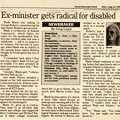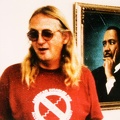Page 8 Apri11988
[Headline] Religion and the disabled
[Subheading] Disability + Power Civil, human rights
by Rev. Wade Blank
This article is about power, a word that has many negative connotations about it. While we admire people who have power, and people who use power, we still fear getting and using power for ourselves. We believe the meek shall inherit the earth," it is better "to be seen and not heard,"
[boxed text] These people gained power by acting, by laying aside social etiquette and taking action in their self interest; they gained power by taking risks.
[text resumes] and being liked means not being too outspoken.
Not only do we have some fear of power; we have great difficulty applying the term to people with disabilities, because our society does not recognize the possibility of a disabled per-son having power or being powerful.
Our feeble attempts at gaining power are done in more accepted and passive ways of urging the vote, writing our congressperson or going to meetings. If the disability movement really wants power so it can address its oppression, then it needs to learn how to get power and how to use it.
In Denver, there are twenty thousand people who use wheel-chairs for mobility. In 1978, the city of Denver had no wheel-chair accessible buses on its mainline system. That meant that there were twenty thousand people in wheelchairs that were not permitted on buses.
To change that situation obviously required power and a lot of it. You could go to all the meetings you wanted, write all the letters you could write, but the situation wouldn't change. A group of twenty five disabled people got together and pledged to each other their willingness to take personal risk and personal action that would change the situation.
First, the actions they would take would educate the public about their need for public transportation. Secondly, they would disrupt the able-bodied to the extent that it would get media coverage and to the extent that civil disobedience would occur and people would be arrested.
In July of 1978, 25 people surrounded two buses at a main intersection of Denver and held the buses for two days. The police didn't arrest anyone because they were afraid of a bad public image.
That action started a year of civil disobedience by those 25 people who did actions every three or four weeks.
Today all 700 buses in Denver have wheelchair lifts. A re-markable demonstration of power! Twenty five people, willing to act, changed the situation for 20,000 people.
These people gained power by acting, by laying aside social etiquette and taking action in their self interest; they gained power by taking risks.
Once they showed them-selves and others how serious they were, and once people understood that these people with disabilities would be back over and over again until they got what they wanted, these once powerless people gained power, and to this day have maintained it.
For the disability movement to succeed, every community in the United States needs disabled people willing to act in their own self interest to gain power. Only with power will all the issues affecting disabled people be won. That power network is now developing but we have a long way to go!
We Will Ride, We Will Be Free!
- נוצר ב
- רביעי 24 יולי 2013
- פורסם ב
- רביעי 9 אוקטובר 2019
- ביקורים
- 178
- ציון דירוג
- ללא דירוג
- דרג תמונה זאת
- Make
- Canon
- Model
- Canon EOS 40D
- DateTimeOriginal
- 2013:07:24 11:18:57
- ApertureFNumber
- f/11.0


0 תגובות